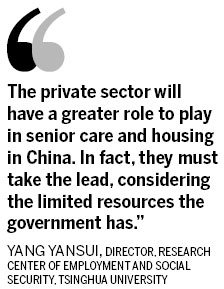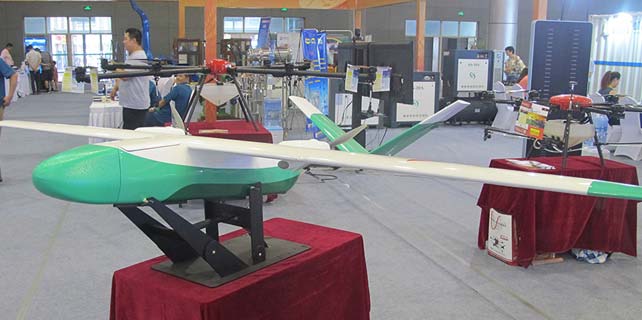

Market entry norms also vary from region to region but this is expected to be unified in the latter half of the year after the Ministry of Civil Affairs publishes detailed regulations on establishment and supervision of elderly care facilities, said Michael Qu, a lawyer with Shanghai Co-Effort Law Firm and editor of China Senior Housing and Care Newsletter.

As more investors join in, more needs to be done by the government to allocate resources more effectively, Shobert said. While there are nursing homes that have long waiting lists, there are also others that find it hard to attract clients because of their remote location and demographics.
"Specifically, the government needs to address the excess and poorly planned senior-housing capacity that is being built across the country," Shobert said. "Too many real estate developers are accessing land by promising to build senior housing, which they do, but without the sort of market research or operating model that will be necessary for the business to be sustainable."
At the moment, government policies that favor domestic entrants over foreign companies mean local companies have an advantage in getting access to land, Shobert said.
"It's a very long and complicated process to get land in China. We usually end up spending a lot of time on that and it can be very difficult," said Wright of Merrill Gardens.
"The biggest challenge for us now is the spending power and habits of the seniors," said Gao of Golden Heights.
"Most retired in the 1980s before the Chinese economy took off. It's impossible for them to afford the senior-care services of today. Moreover, many of them are independent of their children and don't readily ask for allowances," he said.
Gao estimates the market will truly take off 10 years from now when people who made their money in the 1990s get old and ask for senior-care services.
The situation is somewhat better in Shanghai, which is the fastest aging city in China with more than 20 percent of its population over the age of 60. It is also one of the most developed cities in the country.
Huge potential
"From what we see from Shanghai, the consumption power there is enough to support a high-end senior-care market. The elderly might not be rich, but their children are. The potential is huge," said Xie from Cascade.
Shanghai has in fact been a testing ground for numerous investors for another reason: It is also one of the most service-savvy cities in China.
"Seniors in Shanghai are very open to new and Western ideas. It is also much easier to find service-oriented people in Shanghai than in Beijing," said Wei from Vcanland.
Like the hotel business in its early days in China, the senior-care business is seeing a considerable shortage of professionals and carers. China did not start training recovery therapists in its universities until 2000. The huge lack of trained healthcare workers has also been a big problem for many operators.
 CES Asia: Concept cars, futuristic vehicles and intelligent driving
CES Asia: Concept cars, futuristic vehicles and intelligent driving
 2017 CES Asia held in China's Shanghai
2017 CES Asia held in China's Shanghai
 People interact with intelligent robot 'Xiaogui' in E China
People interact with intelligent robot 'Xiaogui' in E China
 Mother of three children becomes a successful entrepreneur
Mother of three children becomes a successful entrepreneur
 WWDC 2017: A glimpse at June's biggest tech event
WWDC 2017: A glimpse at June's biggest tech event
 China-developed drones at Silk Road expo in Xi'an
China-developed drones at Silk Road expo in Xi'an
 Visitors drawn to auto show in Shenzhen
Visitors drawn to auto show in Shenzhen
 Garbage disposal in S China's Guangdong
Garbage disposal in S China's Guangdong